For businesses aiming to enhance their online visibility, attract targeted traffic, and ultimately drive conversions, SEO is indispensable.
By optimizing website content, structure, and technical elements, companies can improve their rankings on search engine results pages (SERPs), making it easier for potential customers to find them.
However, implementing SEO strategies is just the beginning. To ensure these efforts yield desired outcomes, it's crucial to measure and analyze their effectiveness.
This is where Best SEO Reporting Software comes into play. These tools aggregate data from various sources, providing businesses with comprehensive insights into their SEO performance.
By tracking key metrics such as keyword rankings, organic traffic, and backlink profiles, SEO reporting software enables businesses to assess the impact of their SEO initiatives and make informed decisions for continuous improvement.
In this blog, we will delve into the essential features and benefits of SEO reporting software. Additionally, we'll explore some of the top SEO reporting tools available in the market, helping you choose the right solution to elevate your SEO efforts.
What is SEO Reporting Software?
SEO reporting software is a tool designed to collect, organize, and present data related to a website's SEO performance.

Its primary purpose is to track key performance indicators (KPIs) such as keyword rankings, organic traffic, backlinks, and on-page SEO factors.
For agencies managing multiple clients, SEO reporting tools offer a centralized platform to analyze performance across various campaigns. Businesses, on the other hand, can use these tools to monitor their own strategies and compare them to competitors.
These integrations allow the software to pull in valuable insights such as website traffic, keyword rankings, backlink data, and more.
Try Our Free SEO Report Generator Tool
6 Best SEO Reporting Software In The Market
Best SEO Reporting Software like Google Data Studio, SEMrush, Ahrefs, Moz Pro, SEO report generator, and SpyFu offer comprehensive features for tracking keyword rankings, backlinks, traffic, and competitor analysis to optimize SEO strategies. These tools can be particularly valuable for companies and industries like Oil, Gas, automotive, real estate and other sectors, to monitor their SEO performance and make informed decisions to stay competitive in a rapidly evolving market. With the right SEO Services, businesses can use these tools to better understand and refine their SEO strategies.
1. Google Data Studio
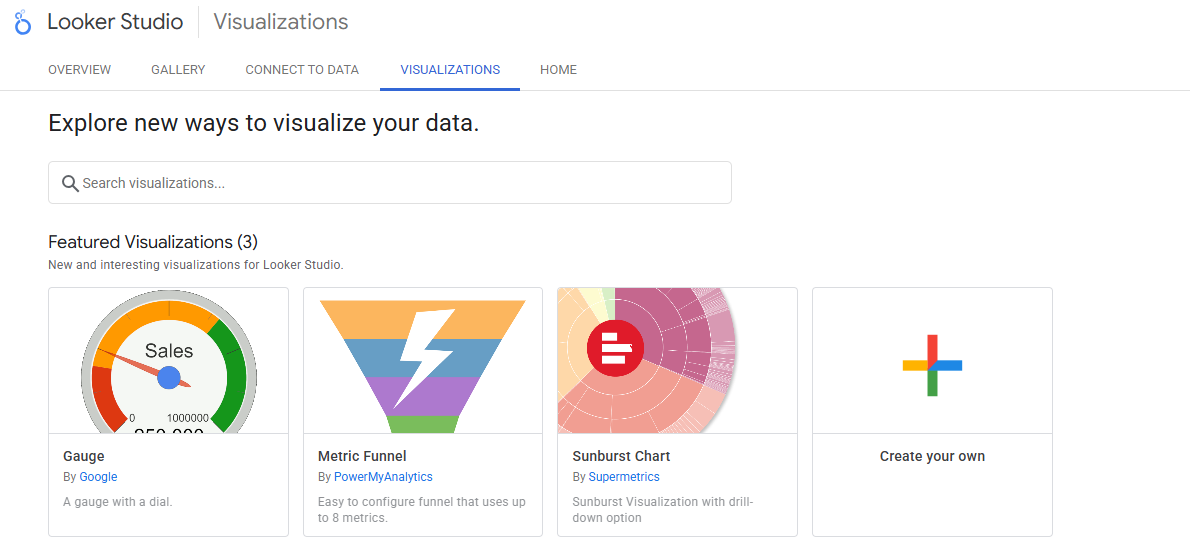
Google Data Studio is a free and highly customizable tool that allows businesses to create SEO reports using data from Google Search Console and Google Analytics .
It offers a variety of data visualization options such as graphs and tables, making it easy to track SEO performance.
However, while it provides powerful customization features, the tool may require some time to learn, and it is not as advanced in SEO-specific functionalities as many paid tools.
This makes it an excellent option for businesses seeking a flexible, free solution to integrate Google data into customizable reports.
2. SEMrush
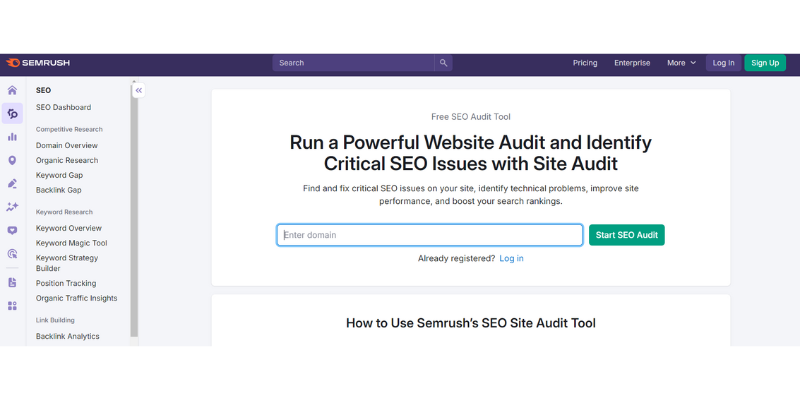
SEMrush is an all-in-one SEO suite known for its comprehensive features, including keyword tracking, backlink analysis, site audits, and competitor research. It offers an intuitive interface and vast data, making it a top choice for businesses that need robust SEO analysis.
However, its cost can be prohibitive for smaller businesses, and the broad range of features may overwhelm beginners. SEMrush is ideal for agencies and businesses that require a complete SEO solution with powerful reporting and analytics capabilities.
3. Ahrefs
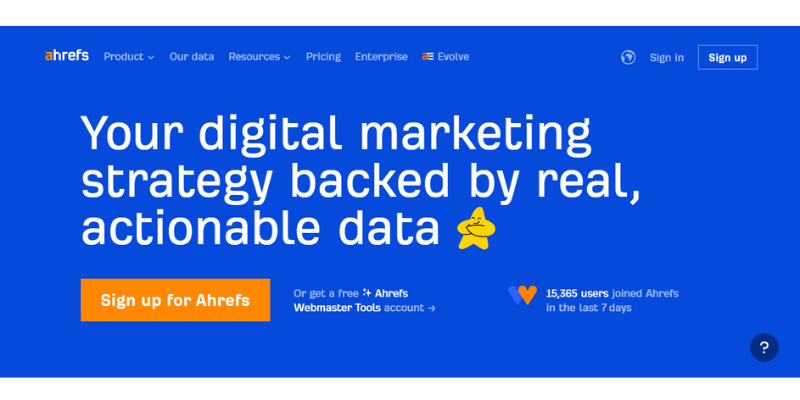
Ahrefs is widely recognized for its backlink analysis and keyword tracking capabilities. It provides a detailed backlink profile, keyword research tools and competitor analysis, making it an essential tool for SEO professionals.
While Ahrefs is known for its strengths in backlinks and keyword tracking, it is relatively costly, and it lacks comprehensive on-page SEO analysis compared to other tools.
For those specifically focused on backlink analysis, competitor research, and keyword tracking, Ahrefs is highly valuable, though it may not be the best SEO reporting tool for users looking for all-around SEO capabilities.
Ahrefs is best suited for professionals focused on backlink analysis, competitor research, and keyword tracking.
4. Moz Pro
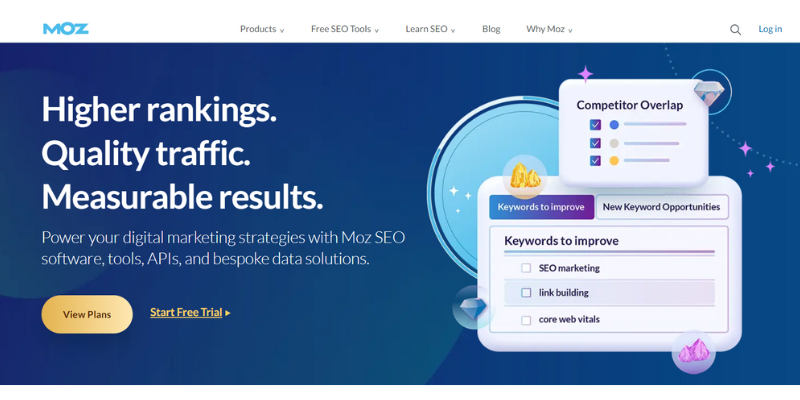
Moz Pro offers detailed keyword tracking, site audits, and competitor analysis, along with the popular "MozBar" browser extension for on-the-go SEO insights.
While it is a user-friendly tool for small to medium-sized businesses, some users find its keyword data to be less accurate compared to other tools, and its reporting capabilities are not as customizable.
For businesses needing straightforward SEO tools, Moz Pro can be a great option for keyword tracking and site audits. However, if you require more advanced features, you may want to consider a more robust SEO ranking reporting software that provides deeper insights and customization options.
5. SEO Report Generator Tool
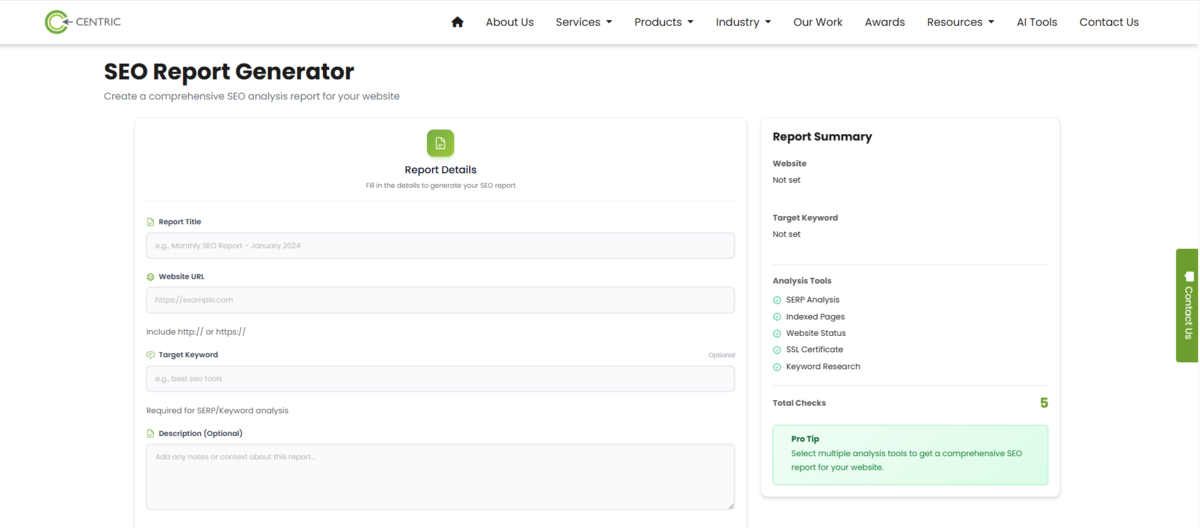
Centric Report Generator tool is a comprehensive tool designed to streamline SEO reporting for businesses. It offers customizable templates and integrates seamlessly with various data sources, allowing users to generate detailed SEO performance reports.
The tool is known for its user-friendly interface, which makes it accessible even for non-technical users.
While Centric Report Generator offers excellent flexibility in terms of design and reporting structure, it may lack some advanced data visualization features found in other specialized platforms.
However, it is a great choice for businesses looking for an free, easy-to-use solution that can quickly generate SEO reports.
Try Our SEO Report Generator Tool
6. SpyFu
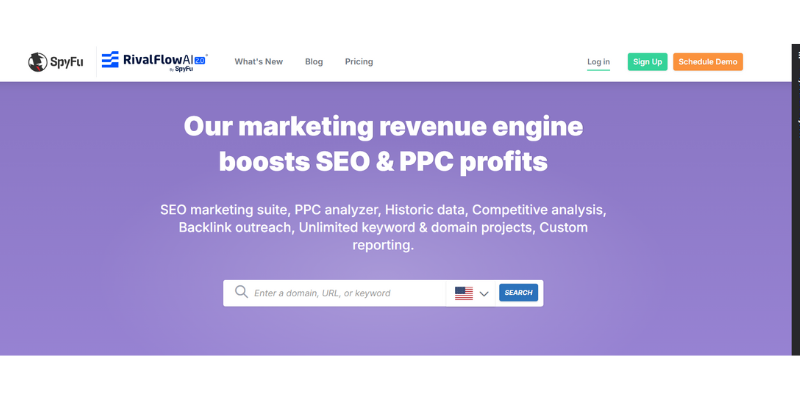
SpyFu excels at competitor analysis and keyword research, offering detailed insights into competitors' keywords and their performance, as well as historical data.
While it focuses heavily on keyword research and competitor analysis, SpyFu lacks some of the on-page SEO features found in other comprehensive tools.
SpyFu is a great option for businesses looking for in-depth competitor analysis and keyword research without the need for a full suite of SEO tools.
Comparison & Summary Of the Top 6 SEO Reporting Tools
Below is a comparison table of the top 6 SEO reporting tools, highlighting their key features and considerations:
| Tool | Key Features | Cost | Drawbacks | Rating |
|---|---|---|---|---|
| Google Data Studio | Free, customizable reports, integrates with Google Analytics & Search Console, data visualizations (graphs, tables) | Free | Lacks SEO-specific features, can be complex | ⭐⭐⭐⭐☆ |
| SEMrush | All-in-one SEO suite, keyword tracking, backlink analysis, site audits, competitor research | Expensive | Costly, overwhelming for beginners | ⭐⭐⭐⭐⭐ |
| Ahrefs | Backlink analysis, keyword research, competitor analysis, detailed reports | Expensive | High cost, lacks on-page SEO analysis | ⭐⭐⭐⭐☆ |
| Moz Pro | Keyword tracking, site audits, competitor analysis, MozBar browser extension | Expensive | Less accurate keyword data, limited reporting customization | ⭐⭐⭐½☆ |
| SEO Report Generator | Customizable SEO reports, integrates with multiple data sources, user-friendly interface | Free | Limited advanced data visualizations | ⭐⭐⭐⭐☆ |
| SpyFu | Competitor analysis, keyword research, historical data | Expensive | Lacks on-page SEO features, not a full suite | ⭐⭐⭐⭐☆ |
5 Benefits of Using SEO Reporting Software
SEO reporting software centralizes SEO data, automates report generation, provides actionable insights, tracks campaign progress, and offers competitor analysis to improve decision-making and efficiency.
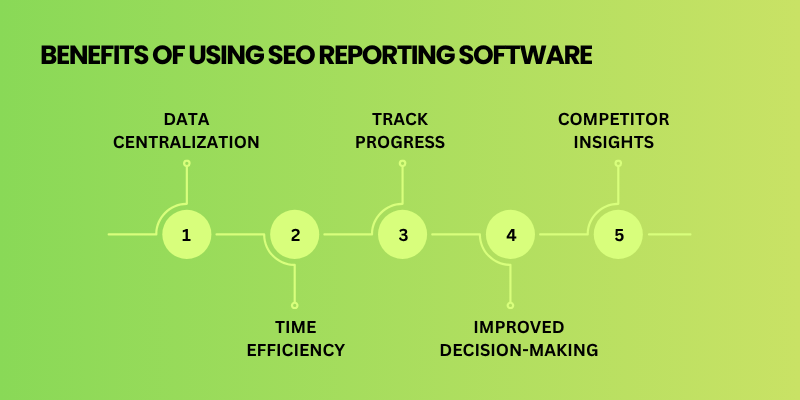
1. Data Centralization
Instead of navigating through various tools and platforms, users can view key performance indicators such as keyword rankings, traffic, backlinks, and site health in one place.
This centralization simplifies the process of tracking SEO performance and ensures that all important data is available at a glance, saving time and effort.
2. Time Efficiency
One of the major benefits of SEO reporting software is its ability to automate reporting tasks. Manual data collection and report generation can be tedious and time-consuming, especially when managing multiple campaigns or clients.
when managing multiple campaigns or clients. SEO reporting tools eliminate the need for manual work by automating the collection and generation of reports on a daily, weekly, or monthly basis.
3. Improved Decision-Making
SEO reporting software provides actionable insights that help businesses make informed decisions about their SEO strategies.
With data-driven decisions, businesses can ensure their SEO efforts are aligned with their goals, improving overall performance.
4. Track Progress
Using SEO reporting software, businesses can compare past and present data, users can evaluate the effectiveness of different strategies, identify trends, and determine the long-term impact of their SEO efforts.
This ongoing tracking enables continuous optimization and ensures that SEO strategies remain effective in an ever-changing digital landscape.
5. Competitor Insights
SEO reporting tools also allow users to track their competitors' performance. By analyzing competitor keyword rankings, backlinks, and traffic, businesses can uncover gaps in their own strategies and identify new opportunities for growth.
Understanding what competitors are doing well provides valuable insights that can guide future SEO efforts and help businesses stay ahead of the competition.
10 Top Key Features of SEO Reporting Software
SEO reporting software offers customizable dashboards, keyword tracking, backlink analysis, technical SEO audits, competitor insights, and automated reporting to optimize and monitor SEO performance effectively.
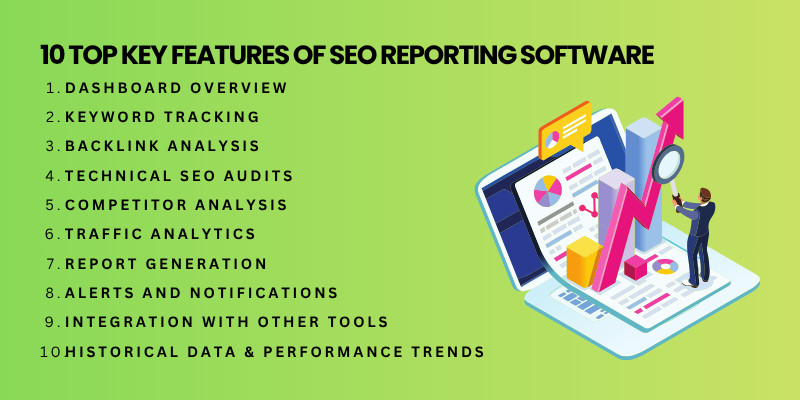
1. Dashboard Overview
One of the most vital features of SEO reporting software is its customizable dashboard, providing users with a comprehensive, at-a-glance overview of their SEO performance.
These dashboards allow users to track multiple Key Performance Indicators (KPIs), such as organic traffic, keyword rankings, backlink profiles, site health, and more.
With a user-friendly interface, these dashboards can be tailored to display the most relevant data, empowering businesses to focus on what matters most for their SEO goals.
Common dashboard features include graphs for tracking keyword ranking progress, pie charts showing traffic sources, and tables listing top-performing pages or keywords.
The ability to customize the dashboard allows users to prioritize specific metrics based on their strategy.
Custom dashboards are invaluable as they save time, enhance efficiency, and allow for quick decision-making, helping businesses adapt their strategies faster.
2. Keyword Tracking
Keyword tracking is one of the core functions of SEO reporting software, making it essential for monitoring a website’s SEO performance.
This feature enables businesses to track the rankings of targeted keywords across search engines, allowing them to measure the impact of their optimization efforts.
Monitoring keyword performance over time helps SEO specialists assess whether their strategies are yielding results or require adjustments.
Features like keyword tracking over time, tracking ranking fluctuations, and SERP (Search Engine Results Page) features such as featured snippets, knowledge panels, or local packs are crucial for SEO success with .
By focusing on keyword performance, businesses can ensure they are targeting the most effective keywords and improving their chances of achieving better visibility in search results.
Check Your Keyword Rankings In Real Time
3. Backlink Analysis
Backlink analysis is a crucial feature of SEO reporting software that allows businesses to monitor the quality and quantity of backlinks pointing to their website.
By tracking new, lost, and toxic backlinks, users can assess the strength of their backlink profile and identify potential risks. Monitoring backlinks helps detect harmful or spammy links that could negatively impact SEO rankings.
This feature aids in identifying high-quality backlinks to build upon and toxic links that should be disavowed to prevent penalties.
A strong backlink profile is vital for improving domain authority and, consequently, search engine rankings.
4. Technical SEO Audits
The technical SEO audits tool helps identify issues that could hinder a website's performance in search engines.
Common technical issues include broken links, slow page load times, missing alt text for images, crawlability issues, and 503 status code issues.
The software often provides actionable recommendations for fixing these issues, such as optimizing images, fixing broken links, and improving site speed.
Regular technical audits ensure that a website is search engine-friendly and offers a positive user experience, which is essential for better search rankings.
5. Competitor Analysis
Competitor analysis features in SEO reporting software allow businesses to track the SEO performance of their competitors.
By examining competitor keyword rankings, backlink profiles, and traffic data, businesses can uncover opportunities and identify areas where they lag behind.
This analysis helps pinpoint gaps in the market and inform strategies to outperform competitors. Whether it's discovering new keyword opportunities or identifying competitor backlinks to target, competitor analysis is an essential tool for staying ahead in the competitive SEO landscape.
6. Traffic Analytics
Traffic analytics in SEO reporting software helps businesses understand the flow of organic visitors to their website. This feature tracks how much traffic comes from search engines, which pages drive the most traffic, and the keywords that contribute to visitor acquisition.
Segmenting traffic by geographic location, device, or other factors provides deeper insights into audience behavior and helps tailor SEO strategies to specific target groups.
Understanding where traffic originates and how visitors interact with the site enables businesses to optimize their SEO strategies for better performance.
7. Report Generation
SEO reporting software often includes customizable reporting features that allow users to create tailored reports based on their specific needs.
These reports can include key metrics such as keyword rankings, backlinks, traffic trends, and technical SEO insights. The ability to schedule automated reports streamlines the reporting process, ensuring that businesses receive up-to-date information without manual intervention.
This automation saves time and allows teams to focus on optimizing SEO strategy rather than spending time on repetitive tasks like generating reports.
Explore Our SEO Report Generator Tool
8. Alerts and Notifications
Real-time alerts in SEO reporting software help businesses stay on top of important SEO issues as they arise. Alerts notify users of sudden changes, such as a significant drop in keyword rankings, traffic dips, or the detection of broken links.
These notifications allow SEO professionals to react quickly and address issues before they negatively impact search engine performance.
9. Integration with Other Tools
SEO reporting software often integrates with popular platforms like Google Search Console and Google Analytics, and other third-party tools to provide a more comprehensive analysis. Integration allows for seamless data synchronization across multiple platforms, ensuring that reports are accurate and reflect the latest data.
By consolidating data from various sources, users gain a holistic view of their SEO performance, enabling more informed decision-making and more precise strategies for improving website rankings.
10. Historical Data and Performance Trends
Historical data and performance trends are valuable tools in SEO reporting software for tracking long-term progress.
By comparing past performance with current data, businesses can assess the effectiveness of their SEO strategies and identify trends that may impact future optimization efforts.
Understanding performance trends allows businesses to adjust strategies based on long-term results, whether it’s refining keyword targeting or improving technical aspects of the website. Historical data also helps in forecasting future SEO outcomes and setting realistic goals.
How to Choose the Right SEO Reporting Software for Your Business?
Choosing the right SEO reporting software for your business involves considering several key factors to ensure it meets your specific needs.
- Ease of Use: The software should have a user-friendly interface that allows you to easily navigate and generate reports without a steep learning curve. A clean and intuitive design is essential for maximizing productivity.
- Feature Set: Different businesses have unique SEO requirements. Select software that offers the features you need, whether it's keyword tracking, backlink analysis, technical SEO audit, or competitor research.
- Integration: Ensure the software integrates seamlessly with your existing platforms like google search console and google analytics.
- Cost: Assess the software’s cost in relation to your budget and expected return on investment (ROI). While more expensive tools often offer advanced features, it’s important to select one that aligns with your business’s scale and needs.
- Customer Support: A reliable support team is vital for resolving issues quickly. Check the availability of customer service, tutorials, and resources to ensure you can get help when needed. Additionally, with the right SEO ranking reporting software, your team will have access to valuable insights that can guide your strategy.
FAQs: Best SEO Reporting Software
What is SEO ranking reporting software?
SEO ranking reporting software tracks and reports a website's performance in search engines, providing insights into keyword rankings, traffic, and backlinks to help optimize SEO strategies.
What is the best SEO reporting tool?
The best SEO reporting tools include SEMrush, Ahrefs, and Moz Pro, which offer comprehensive keyword tracking and reporting features for better SEO optimization.
How does SEO reporting software for clients help agencies?
SEO reporting software for clients automates the generation of detailed SEO reports, helping agencies provide transparent performance data and demonstrate the impact of their work.
What features should I look for in SEO business report software?
Look for features like customizable dashboards, keyword tracking, backlink analysis, automated reporting, and integration with Google Analytics for efficient SEO monitoring.
Can SEO ranking reporting software improve search rankings?
Yes, it provides actionable insights that help businesses adjust their SEO strategies, improving keyword rankings and overall performance.
How does SEO reporting software assist with competitor analysis?
SEO reporting software tracks competitors' keyword rankings, backlinks, and traffic, helping businesses uncover gaps and optimize strategies to outperform them.
Conclusion
Best SEO reporting software plays a pivotal role in digital marketing by providing businesses with the tools to track, analyze, and optimize their SEO efforts. As search engines continue to evolve, businesses must stay ahead of the competition by continuously measuring the success of their SEO strategies. SEO reporting software consolidates key metrics, such as keyword rankings, organic traffic, backlinks, and site health, into actionable insights. These tools allow businesses to make data-driven decisions, prioritize areas for improvement, and stay aligned with their SEO goals.
The ability to monitor SEO performance in real-time ensures that businesses can adapt quickly to changes, fix issues promptly, and leverage new opportunities. With automated reporting, businesses save time and resources while maintaining a consistent focus on improving their online presence. To stay competitive in today’s fast-paced digital environment, it is essential for businesses to implement SEO reporting tools.
These tools not only help measure performance but also provide valuable insights for refining strategies and achieving long-term SEO success. By adopting Centric SEO reporting software, businesses can enhance their SEO efforts and maintain a strong foothold in the market.









